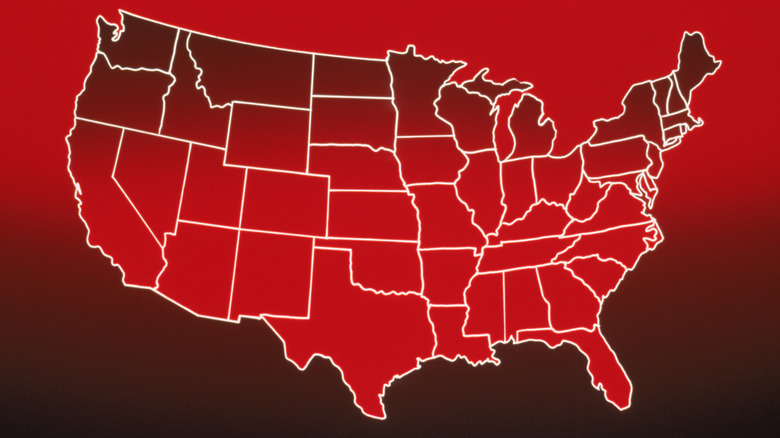Florida Won't Tax Your Social Security Benefits, But These 9 States Will
When considering quintessential retirement locales within the United States, the state of Florida will surely feature highly on anyone's list. Even though Florida may not technically be the best state to retire in based on certain metrics, its climate is warm year-round without being nuclear hot during summer, like some parts of Arizona. Besides desirable weather, Florida offers something else that's extremely attractive to retirees: no state tax on social security benefits.
To be clear, since 1983, it's been impossible to avoid paying federal income tax on your social security benefits in retirement. However, residents of nine states will possibly pay an additional 1.7% to 9.85% in state tax on their social security checks, depending on which particular state is involved and their overall income situation. If there's a silver lining to the additional taxing of social security in those nine states, it's that several are relaxing their laws during the next few years. With that, it's time to name some names.
Here are the nine states that tax social security
In alphabetical order, the nine states that tax social security are: Colorado, Connecticut, Minnesota, Montana, New Mexico, Rhode Island, Utah, Vermont, and West Virginia. To be clear, the other 41 states, including the retirement mecca of Florida, don't tax social security benefits, though you'll still pay federal tax in your appropriate bracket. By the way, Washington, DC residents also aren't taxed on social security. That said, if you're considering retiring in one of the states that does tax these fundamental retirement benefits, here's what you can expect to pay.
Colorado may be known for its rugged beauty and epic skiing, but its state income tax rate is a not-inconsequential 4.4%. Fortunately, seniors age 65 and older are exempt from paying that state tax on social security beginning in 2025. Younger retirees will also be exempt in 2025-onward if their annual incomes are $75,000 or less individually or $95,000 or less if filing jointly.
Residents of Connecticut face a more complicated variable state income rate that ranges from 2% up to 6.99%. However, individuals with income of $75,000 or less can fully deduct all of their social security benefits, as can couples earning $100,000 or less. If you're lucky enough to have income in excess of those amounts, you can still get a partial exemption from state social security tax, capped at taxing a modest 25% of your benefits.
Additional states' policies are as follow
Next up is Minnesota, which levies a hefty state income tax between 5.35% and 9.85% for regular earned income. The full gamut of relevant tax rules for the Land of 10,000 Lakes is beyond the scope of this article, but a key takeaway is that taxpayers earning $82,190 or less individually or $105,380 or less jointly can subtract all of their social security benefits. If you earn more than these amounts, it's likely that you'll qualify for at least a partial tax break.
Fans of the neo-western drama "Yellowstone" might be considering the vast expanses of Montana for their retirement nirvana. However, Montana isn't as lenient as some other states on this list regarding the deduction of social security benefits. Total exemption is only possible for single filers earning $25,000 or less annually, or joint filers earning $32,000 or less. Higher earners can still deduct some of their social security benefits, but at a much lower proportion. For the record, Montana's tax rate varies between 4.7% and 5.9%.
New Mexico levies a state tax of 1.7% to 5.9% on earned income, but the good news for seniors is that the threshold for paying any tax on social security is quite lofty. Single filers can earn up to $100,000 annually while still exempting their social security benefits from state taxes. For joint filers, it's $150,000 earned annually.
What about other states large and small?
Rhode Island is the smallest state in the union, and its tax burden on retirees is also fittingly small among those states that do tax benefits. Although Rhode Island's tax rate is 3.75% up to 5.99%, you'll need to earn quite a lot of income before incurring its impact on your social security benefits. Specifically, incomes up to $101,000 for single filers or $126,250 if married filing jointly are exempt.
Active retirees might favor living in Utah for its plethora of national parks, hiking, and breathtaking rock formations. However, there's a price to pay for living in the Beehive State. Utah only receive a full pardon from paying state tax on social security if income is less than $45,000 for single filers or $75,000 for couples filing jointly. Though to be fair, at least a partial tax break is available for higher earners. Note that Utah's tax rate is a fixed 4.55%.
Fans of New England's historical appeal and architecture might do well to choose Vermont in retirement. That said, taking advantage of Vermont's hiking, skiing, lakes, and mountains will ding your wallet with a state income tax that varies between 3.35% and 8.75%. Social security recipients won't be required to pay this tax if their adjusted gross income is $50,000 or less. Alternatively, couples filing jointly can make up to $65,000 combined and still remain exempt.
West Virginia is removing the tax soon
Finally, all residents of West Virginia can currently deduct 35% of their social security benefits from their overall income, with no restrictions, when calculating state tax obligations. For 2025, that deduction jumps up to 65%, and taxing social security disappears entirely in 2026.
To recap, while the uber-popular retirement destination of Florida doesn't tax social security, neither do 40 other states. And that's soon be 41 other states (42 total) to include West Virginia in 2026. Not to mention more relaxed laws in Colorado next year.
However, astute retirees will be prudent to observe that taxing social security isn't the only factor when determining whether a state is inexpensive to live in. Other elements like property tax, sales tax, and the price of energy can increase the cost of living. If you're thirsty for more data about how different states rank, check out Money Digest's list of the five most expensive states to live in.




